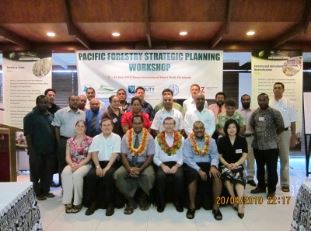Delegates at a regional forestry workshop being held in Nadi, Fiji identified population growth, land tenure, unsustainable agricultural practices, political will and environmental shocks as important issues affecting the development of the forestry sector.
The workshop brought together senior government officials from the Pacific Islands to discuss the future of forestry in the region.
Patrick Durst, UN Food and Agriculture Organization (FAO) Senior Forestry Officer, provided some background on how the workshop had come about. The idea of the workshop came from discussions on the results of the Asia-Pacific Forestry Outlook Study at the Heads of Forestry meeting held in Nadi in 2009.
‘In the discussions of the outlook study results, participants said that the country reports and analysis were all very good, but what next? How does it change anything? Having been involved in the last outlook study 10 years ago we recognised the need to do a better job of using the findings of the study and the information to improve forestry development. A suggestion was made to work with countries to make better use of the information. That is what we aim to do here at this workshop; specifically, we want to help countries advance forestry strategic planning, making better use of country and regional data, information and scenario analyses’.
In welcoming participants to the workshop Mr. Inoke Ratukalou, Acting Director of the Land Resources Division of the Secretariat of the Pacific Community (SPC) urged participants to view this study ‘not just as a set of reports on the shelf but as an important step forward that countries can use to respond to future challenges and development in the forestry sector’.
‘Strategic planning involves reflecting on what we want the sector to look like in the future and planning how to get there. The absence of well-developed and coherent forestry policies that link with national planning processes is likely to result in ad-hoc development of the sector that is inconsistent or uncoordinated with developments in other sectors and risks being driven by personal interests. For example, when agriculture and forestry policies are developed in isolation, priorities are unlikely to be harmonised and may even conflict. Joint planning processes and broad-based stakeholder consultation can assist in ensuring that policies are complementary and aligned to national development priorities,’ said Ratukalou.
But even where a policy or plan exists, participants said, far too often they are not actually implemented due to capacity constraints, resource constraints and a lack of political will.
Participants were encouraged to identify key drivers of change in the sector, both internal and external. ‘In developing forest policies we need to think a lot more broadly about the drivers of change that affect forestry and are outside the forestry sector and how we might engage better with stakeholders in other sectors to promote coherent government policies,’ suggested Livo Mele, Director of Forestry in Vanautu.
Delegates from eight Pacific Island countries will develop policy briefs during the workshop highlighting key issues for the forestry sector in their countries. They will use these as information and advocacy tools to present to stakeholders at home to feed into planning processes, policy development and review with the aim of generating discussion on the future strategic direction of the sector.
The workshop concluded on Friday 23 April.
Please contact Mr Sairusi Bulai ( This email address is being protected from spambots. You need JavaScript enabled to view it.), Coordinator of the Forests and Trees/Forestry and Agriculture Diversification Groups at SPC, for more information.





CONNECT WITH US